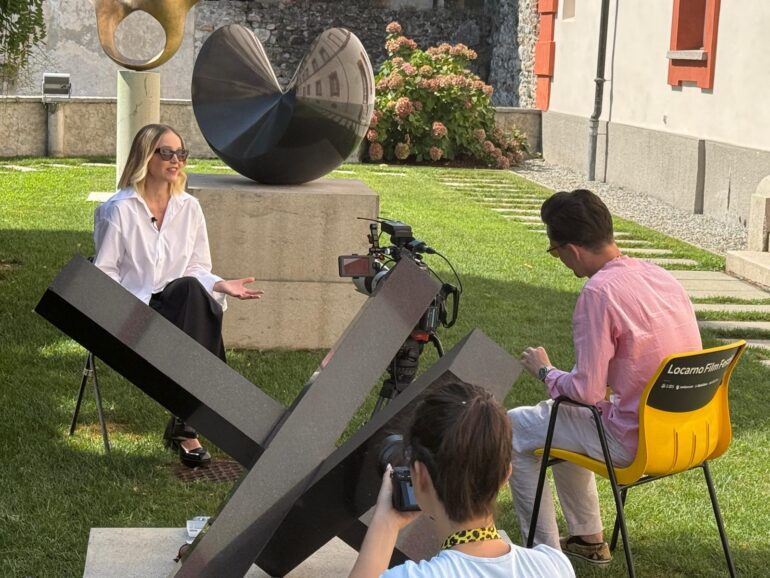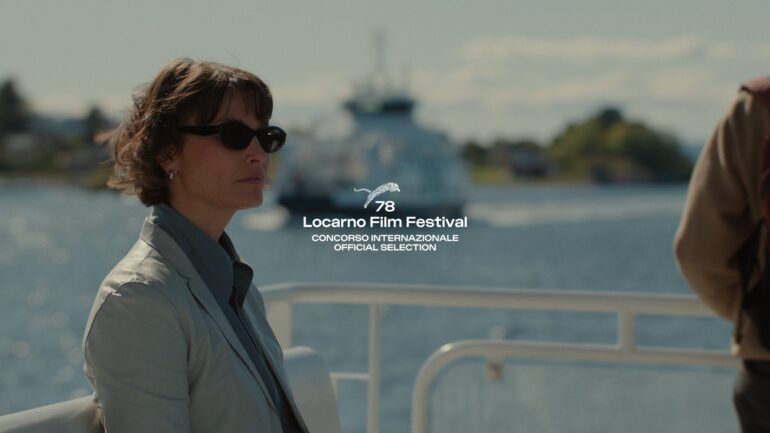WRITTEN BY: Davide Abbatescianni
The Norwegian helmer’s pic, premiering in Locarno’s main competition, is a sensitive drama that delves into the emotional complexities identity, truth, and the ties that shape us.
Norwegian filmmaker Janicke Askevold brings an intimate perspective to the Locarno Film Festival (6-16 August) with Solomamma, a drama exploring the emotional terrain of single motherhood and the complex bonds between parents, children, and the people who shape their lives.
World premiering in the Swiss gathering’s international competition, the film follows Edith (Lisa Loven Kongsli), a competent yet lonely mother navigating the roles of both mum and dad while longing for connection. When the truth about her child’s donor (Herbert Nordrum) surfaces, she is confronted with the “ready-made family” she once imagined - only to realise the fantasy may not match her reality.
A graduate of the Atelier Theatral de Création in Paris, Askevold kicked off her career in theatre before moving into film with the short Le Contrat (2020) and her TV-film debut Sammen Alene (2021). Supported by the Norwegian Film Institute’s NEO talent scheme, Solomamma is her first feature film.
Budgeted at €1.2 million and shot over five weeks in September and October last year, it is produced by Norway’s Bacon Pictures Oslo alongside Lithuania’s Dansu Films, Latvia’s Mistrus Media, Finland’s It’s Alive Films, and Denmark’s Bacon Pictures CPH. Scanbox will release the film in the Nordics, with Playtime handling international sales.
During her conversation with Nordisk Film and TV Fond, the helmer unpacked several key themes, including modern motherhood’s evolving forms, the challenges of solo parenting, the ethics surrounding sperm donation, and how family ties extend beyond biology.
Solomamma has its roots in real conversations you had with women who became mothers on their own. How did the project start?
It began when a friend told me she had found the biological father of her son on social media and had started a relationship with him - without telling him the truth. I immediately felt this was the beginning of a story worth exploring. It made me think about modern motherhood and the many forms it takes. I did a lot of research, met solo mothers across Norway, and built the story’s foundation on real events. It was important to me that everything in the film could happen in real life. I also discovered how these women find each other - online and offline - creating support groups, sharing advice, and even introducing children to their half-siblings so they can grow up with another family connection.
How long did the script development take?
About a year and a half. The first draft was written three and a half years ago. From the start, we wanted to avoid the classical “girl meets boy” storyline. The focus had to remain on her intimate journey as a mother, not on a romantic subplot.
The film tackles complex and sensitive topics. How did you avoid passing judgment?
We decided to go beyond the question of whether it’s a “good” or “bad” choice. In Scandinavia, solo motherhood is becoming increasingly common, and I wanted to normalise it. She’s not a heroine; she’s a human being with flaws, strengths, insecurities and curiosity. The only criticism I touch on is towards sperm banks, which operate within a market that can take advantage of women in vulnerable situations - especially when they charge more for extra donor information.
What qualities were you looking for in your leading actress?
I wanted someone strong, independent, and able to make her own choices - but also capable of showing vulnerability. Lisa is beautiful, but she never uses her charm to get what she wants. She’s confident, and her acting is deeply expressive even in silence. We also tested her chemistry with Niels, who plays the donor, and it was immediately clear they worked well together.
Your background is in theatre. How did this shape your directing style?
Theatre taught me to work organically with actors. I love doing rehearsals and developing detailed backstories - even for what happens off-screen. I see directing as a conversation with the actors. My acting experience also made the set feel like a familiar environment.
In your director’s notes, you describe the visual style as a mix of intimate naturalism and stylised touches. How did you and your DoP Torjus Thesen achieve this?
We aimed for heightened realism without letting style dominate the story. We talked about Agnès Varda, François Truffaut, and the French New Wave films for their playfulness and lightness, but avoided clichés. When the protagonist visits the donor’s house, the tone shifts towards a thriller - here, Parasite (Gisaengchung) was a reference. With limited shooting days, we had to make strong compositional choices to tell a lot with few images.
Motherhood has been widely explored in European cinema. Did you actively avoid certain clichés?
Yes. I didn’t want the narrative to become a choice between two love interests. The emotional journey of the mother was always the focus. That meant “killing” a lot of characters and subplots in the writing process, which was painful, but necessary.
The film is an international co-production between multiple countries. What was it like working with so many partners, and what impact did the Neo scheme have?
Working internationally adds complexity - distance, language - but also richness. For example, our Lithuanian composers Karlis Auzans, Paulius Kilbauskas and Vygintas Kisevicius brought unexpected and meaningful nuances to the film. The Neo scheme and the Norwegian Film Institute gave us complete creative freedom, which was invaluable for a feature.
What about your biggest challenge?
Time. Low budget means short shooting schedules. We also had to manage my “double life”, as I live in France, but had to work on the project in Norway, including post-production.
The film has already been sold to several territories, including Italy, Benelux, Israel, Switzerland, and Hungary. Are you curious about how different countries will receive it?
Absolutely. In Norway, a law change five years ago made solo motherhood through assisted reproduction legal, free, and accessible in public hospitals. This sends an important social message. In other countries, such as Italy, it remains illegal, and attitudes vary widely. I hope the film can show that there are many forms of family, none better than the other.
Do you see yourself returning to this theme in future projects?
My next Norwegian fiction feature is in early development, and it will explore another type of family. It’s too soon to say more, but I’ll definitely keep engaging with questions around family structures.

